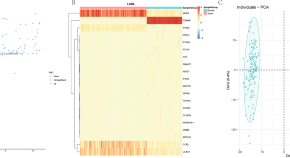T cell-mediated tumor killing sensitivity gene signature-based prognostic score for acute myeloid leukemia
Authors (first, second and last of 7)

Collection
Cancer is a complex disease with disrupted signalling pathways and crosstalk, which contribute to its heterogeneity and treatment response. Traditional methods face challenges in understanding these molecular circuits. However, recent advances in computational techniques offer new opportunities. These approaches can analyze multidimensional signalling crosstalk data, predict behaviours, infer mechanisms, and identify vulnerabilities. By using diverse computational methods, we can gain insights into cancer signalling circuits and develop targeted therapies. Investigating signalling crosstalks in cancer is challenging due to integrating heterogeneous data types, modelling nonlinear effects, and accounting for the tumor microenvironment. Validating predictions and determining causation are also difficult. Reproducible workflows and addressing barriers such as cost, scalability, and data sharing are crucial. Integrating longitudinal patient data and treatment responses adds another technical challenge. Advanced computational methods are needed to condense crosstalk signals into targetable modules for therapeutic targeting. This Collection aims to gather cutting-edge research that utilizes advanced computational biology approaches to illuminate the complex landscape of signalling crosstalks in cancer and analyze pathway crosstalks in cancer. Submissions across all cancer types and diverse computational methodologies are encouraged.
Keywords: cancer signalling pathways, signalling network crosstalk, cancer biology, modelling
Southern Medical University, China.
Dr. Simin Li obtained her BDS and MSc from Harbin Medical University, which is one of the most famous medical universities in China. She obtained her PhD from the University of Leipzig and was awarded the Dr. Karl Zeiss Award (the best doctoral dissertation of the University of Leipzig 2020). After that, she did four years of postdoc research at the Southern Medical University in China.
University of Leipzig, Germany.
Dr. Gerhard Schmalz obtained his Ph.D. from the University of Leipzig, one of the oldest universities in Germany. He is currently working as an Assistant Professor at the University of Leipzig. He is also serving as an Editorial Board member of Discover Oncology.
Regional Centre for Biotechnology, India.
Dr. Prabhakar Mujagond is a distinguished microbiologist with a Ph.D. from Gulbarga University, Karnataka, India. Currently, he holds the position of Senior Manager of R&D (Molecular) at Medsource Ozone Biomedicals Pvt. Ltd. in Faridabad, India. Dr. Prabhakar has a rich history of professional experience, including key roles in the development of Molecular Diagnostic IVD kits and genomic RNA extraction kits. He has dedicated himself to advancing research in microbiology and life sciences.

